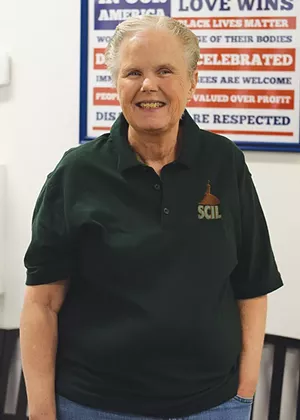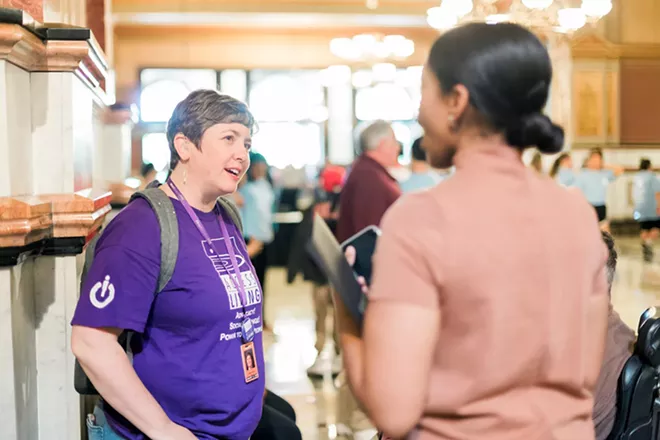The scene was brutal: 32 adult men with intellectual disabilities were housed in segregation in an abandoned schoolhouse rented by Henry’s Turkey Farm in Iowa. A social worker who checked on her clients found them living in squalor, sleeping on soiled mattresses in a residence infested with rodents and cockroaches, a leaking roof, windows covered with plywood, and with no heat.
The men worked alongside non-disabled employees gutting turkeys, but were paid less than minimum wage, averaging 41 cents per hour. Records show employees never brought home more than $65 a month, with Henry’s Turkey Farm also collecting their Social Security Disability Insurance payments as part of their room and board. Though the wretched abandoned schoolhouse cost Henry’s Turkey Farm only $600 a month to rent, it charged its 32 employees a total of nearly $40,000 per month for room, board, and other fees.
Henry’s Turkey Farm limited contact between disabled workers and their families. Medical care was scant, as was care in general. One employee went missing during the winter, presumed to have wandered off, but was not found until spring, entangled in a barbed-wire fence.
This appalling scene may seem like a chapter in history we have long since closed, but the abuse at Henry’s Turkey Farm was discovered in 2009. The farm had employed and housed disabled workers for 30 years.
While an extreme example, critics of the subminimum wage say this is exactly the reason it should be ended. Federal law currently allows disabled workers to be paid less than minimum wage, even when working alongside non-disabled employees completing the same tasks. Some disability rights advocates and legislators want to change that.
Photo by Norma Zuniga
Starla Norris, access coordinator for Springfield Center for Independent Living.
How did we get here?
The subminimum wage exemption was passed into law as section 14(c) of the Fair Labor Standards Act, which was part of New Deal legislation passed in 1938. The original intention was “to provide training for people with disabilities who didn’t have employment opportunities at the time in the 1930s,” according to Barry Taylor, the vice president for civil rights and systemic litigation for Equip for Equality, an advocacy group focused on civil and human rights for people with disabilities. The organization is headquartered in Chicago but also has offices in Springfield and Carbondale.
“The goal was to give them training, and in that process to pay a subminimum wage, with a goal of transitioning them to integrated and full employment. That goal was not achieved,” Taylor said, noting that subminimum wages were intended to be temporary during the training period, not an ongoing rate of pay.
In practice, subminimum wage often takes the form of sheltered workshops and segregated warehouses where disabled workers with high support needs are paid to manufacture piecework or to assemble kits, often with the assistance of work coaches and other support staff.
Governor JB Pritzker signed an executive order on Oct. 4 which phases out the subminimum wage for employees of vendors with state contracts. There are 92 14(c) certificate holders statewide, employing approximately 10,000 disabled individuals, with some paying wages lower than $1 an hour. However, Pritzker also noted that about 80% of companies that contract with the state already pay disabled workers minimum wage.
In the Springfield area, five institutions pay employees a subminimum wage under the 14(c) exemption: Sparc (83 employees), Land of Lincoln Goodwill Industries (21), and Springfield Development Center (6), plus Pathway Services Unlimited (51) and Elm City Rehabilitation Center (11) in Jacksonville.
Photo courtesy Sparc
Donna proudly displays the biscuits she has cut out. Sparc’s dog biscuits are available at Hy-Vee and participating retailers in the Springfield area.
Doug McDonald is the CEO of Sparc, a nonprofit organization in Springfield whose mission is “to enrich the lives of those with intellectual and developmental disabilities by enabling them to successfully live, learn, work and socialize in the community.” Sparc provides services including 24-hour residential care and supported living, in addition to workforce development and life skills training.
McDonald states that those who take part in Sparc’s sheltered workshops are there by choice, as they want to participate in society at large and have a meaningful day. “We support doing everything we can to maximize someone’s independence and ability to be successful in the community,” he said. Workers are paid according to their performance in a timed study. Some employees make minimum wage, or close to it, while others may make less than $1 dollar per hour.
Anne Clemons, Sparc’s vocational director, states that even employees who make less than minimum wage still perform to the best of their ability. “[The employee] is satisfied with the paycheck he gets, because he has the opportunity to get a paycheck. They’re not all earning the same amount every week. It is based on their own personal production.”
Sparc also works with 30-40 employers to place disabled workers in businesses throughout the community, mostly working as janitors or custodians. Everyone in Sparc’s work training program has access to a job coach and receives other support as required. These can include basic needs such as assistance with toileting, eating, and general supervision.
McDonald states his primary concern with ending the subminimum wage is the effect on individuals with high support needs. “We could end up with people potentially not having meaningful employment because they don’t fit into that model (of self-sufficiency). They need more support, and more efforts to help them be successful. I think everybody is capable of living up to their maximum potential. But it’s like with anyone trying to fit someone into a category of a successful person – we’re all different and provide different things in the community. This is the same with the people we serve. There are many ways they can be integrated into the community and serve a role in the community, but it’s not as simple as it sounds.”
A long overdue change
Starla Norris, the access coordinator for Springfield Center for Independent Living, 330 South Grand Ave. West, states that the governor’s executive order is long overdue. “It’s been a long time coming. It was an old, antiquated rule that allowed people to get rich off the backs of people with disabilities.”
She points to cases like Henry’s Turkey Farm as a prime examples of the shortcomings of the subminimum wage. Locally, in 2007, Norris advocated with then-U.S. Senator Barack Obama for disabled employees who had cleaned federal buildings in downtown Springfield for two years before Challenge Unlimited, an Alton-based nonprofit that claims to be a national leader in providing employment for disabled workers, took over the state vendor contract.
Photo courtesy Access Living.
Amber Smock is the director of advocacy at Access Living, a Chicago-based disability rights advocacy group that is staffed by disabled individuals.
Challenge Unlimited conducted time studies with disabled employees, without a coach or advocate present, and reduced employee wages significantly based on the results, which involved cleaning intentionally dirtied restrooms and unfamiliar rooms. Norris said that with the help of Obama’s office, a lawsuit on behalf of the disabled workers was filed in federal court, resulting in a monetary judgment awarded to those workers. However, Challenge Unlimited still operates throughout southern Illinois with nearly 300 employees on a 14(c) certificate receiving the subminimum wage, the largest number of employees of any certificate holder in the state. The organization declined an interview request for this article.
“Everybody deserves a working wage, no matter what, no matter who they are,” states Norris. She points to Land of Lincoln Goodwill Industries as another example of exploitation of disabled employees. “It’s hard when you see people getting rich off the backs of people with disabilities. Donations don’t cost them a dime. And they’re paying their top brass a lot.”
Norris was referring to a controversy that came about in 2019 when Goodwill Industries announced layoffs of disabled workers in its Vocational Rehabilitation Program, blaming it on the state’s plans to incrementally increase the minimum wage to $15 an hour by 2025. Following public outcry and criticism from state lawmakers, who called for a review of state funding awarded to Goodwill, the organization reversed course, and its CEO, Sharon Durbin, resigned.
Ron Culves, the current CEO of Land of Lincoln Goodwill Industries, declined an interview request but responded to questions from Illinois Times by email, stating that currently, only 18 employees receive a subminimum wage as part of the 14(c) certificate exemption and that Goodwill “will continue to work with staff, guardians and consultants as we transition the remainder of our mission-based employees into competitive, integrated jobs within our organization,” thus ending their participation in paying a subminimum wage.
Read Also: Tips For Building A Strong Resume
The fight continues
Representative Theresa Mah, D-Chicago, says she was fortunate enough to have disability advocates in her district, both individuals and members of the advocacy group El Valor, to help her learn about the subminimum wage and its detrimental effect on disabled workers. In 2018, she proposed legislation to develop a five-year plan to phase out the use of the subminimum wage. Despite having 31 co-sponsors in the House, it failed to progress after being sent to subcommittee early in the 2019 session.
Photo courtesy Sparc
Michael, a Sparc employee, stocks a display of Beg-O-Bone dog biscuits at a Springfield retailer.
“There’s absolutely no justification for someone to be paid less than minimum wage, especially if the 14(c) exemption has been used to allow people to be paid as little as 22 cents per hour,” says Mah. “There’s no reason for us to allow that to happen if we can help it.”
Though the governor’s executive order phases out the use of the subminimum wage for vendors receiving state contracts, it is still legal throughout Illinois, except in Chicago. Two years prior to the statewide executive order, the city of Chicago had announced 2019 its decision to phase out the use of the subminimum wage. Four states have abolished its use entirely, while four others are working gradually to that end.
The U.S. Commission on Civil Rights is also on board. The Commission’s 2020 Statutory Enforcement Report recommends, “Congress should repeal Section 14(c) with a planned phase-out period to allow transition among service providers and people with disabilities to alternative service models prioritizing competitive integrated employment,” citing potential abuse with little oversight by the Department of Labor as the primary concern.
Taylor of Equip for Equality says that critics of ending the subminimum wage “get used to a certain system and think there aren’t other options.” He says it is useful to look at states that have already phased out the subminimum wage as examples or inspiration. “It’s not a new or radical concept. It’s the way of the future. There are things people are going to have to figure out to make sure this transition is a positive one. Most successful ways are gradual, thinking out a plan and giving people time to modify practices and policies.”
Taylor believes a phaseout of the subminimum wage shouldn’t involve disabled employees with high support needs being excluded from the workplace. “It’s not a binary choice,” states Taylor. “What’s important is that you don’t eliminate the subminimum wage and wish people well. You provide more support for supported employment. You realign where your federal funding is going to give people real opportunities and real choices. These transitions are possible, and it takes planning and a realignment of funding and effort.”
He says that for workers with high support needs, “It depends on what their ultimate goals are. For some folks earning a wage isn’t important, they just want to be out of their house. For some folks, it’s about having a meaningful day, with activities planned and volunteer opportunities. It’s about person-centered planning, and figuring out what that person wants and needs” to achieve their desires.
Nothing about us without us
What is vitally important, say people with disabilities, is having a voice for themselves. “Folks with disabilities were the first to say we needed choices,” says Amber Smock, director of advocacy at Access Living, a Chicago-based disability rights advocacy group that is largely staffed by disabled individuals. “The default option has always been sheltered workshops. And then here come folks with disabilities, and we say, we actually want a choice beyond workshops.”
One of the main issues with sheltered workshops, notes Smock, is that they are segregated workplaces that can produce a toxic environment with uneven power dynamics. She cites Henry’s Turkey Farm as the ultimate example of the dangers of nonintegrative employment. “Providing board and food, and keeping people locked away with no interaction, that creates situations ripe for abuse.”
The other issue is the idea that the work that disabled people do is not worth as much. “People know about the Fight for $15,” notes Smock, referring to the movement to raise the minimum wage to a living wage. “Why doesn’t this apply to people with disabilities? We know we’re not paid the same as other people. We know it’s not enough to live on. The pay you’re giving us puts us into perpetual poverty, and we’ll always be dependent on others.”
Norris agrees. “The sad thing is, those folks who are making subminimum wage will never catch up. They’ll never achieve the American dream because they were left behind. That’s the saddest part. They have the capability to achieve their dreams if they are given a good minimum wage. It’s pretty simple.”
Proponents of ending the subminimum wage say the governor’s executive order is just the beginning. Mah says she plans to continue working on the legislation she introduced in 2018. “Change is not necessarily easy. I acknowledge that, but this is a situation that really needs reform. As legislators, our approach is to try to nudge things along through the legislative process.”
Taylor reminds us, “This is something everybody should care about. It’s about people getting a fair wage. We all as Americans believe that people who work should be paid fairly. The idea that we would keep one group in a subminimum wage category just because they have disabilities and because there’s a historical program that was well-intended but didn’t work – it’s time for a change. People with disabilities shouldn’t be treated like second-class citizens.”
Carey Smith is an advocate of both a living wage and the rights of disabled individuals.
Source by www.illinoistimes.com



















































